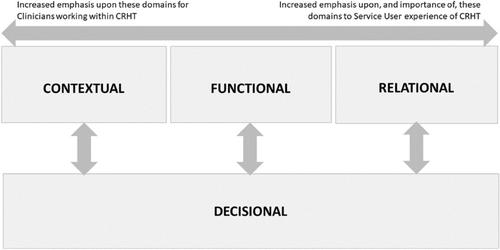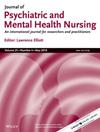Care giving and receiving for people with complex emotional needs within a crisis resolution/home treatment setting: A qualitative evidence synthesis
Abstract
What is known on the subject?
- The term ‘complex emotional needs’ (CEN) is used here to describe people with difficulties and needs that are often associated with the diagnostic label of ‘personality disorder’.
- People with CEN might use out of hours services such as emergency departments and Crisis Resolution/Home Treatment (CRHT) teams more often when experiencing a mental health crisis.
- Very little is understood about the experiences of both those receiving, and those delivering care, for people with CEN within CRHT settings.
What this paper adds to existing knowledge?
- There are differences between priorities for those delivering and those receiving care within CRHT settings. CRHT staff members are likely to focus more upon those aspects of their role relating to risk issues. managing resources, anxieties and the expectations of others. Service users, meanwhile, focus upon the caring relationship, wanting staff to listen to them, and to feel supported and reassured.
- In the papers reviewed, service users experiencing CEN did not always feel ‘listened to’ or ‘taken seriously’ especially in relation to risk issues and decision-making.
What are the implications for practice?
- Relating the findings to mental health nursing and CEN within the context of CRHT, to better understand the person experiencing a mental health crisis, mental health nurses need to focus more upon the person and when making decisions around their care and must be aware of the potential for power imbalances.
- Collaborative ‘sense-making’ in relation to a person's risk behaviours may help.
4.1 Background
A growing body of qualitative evidence focusing upon the experiences of care within Crisis Resolution/Home Treatment (CRHT) is emerging; however, a firm evidence base regarding both the giving and receiving of care for those with complex emotional needs (CEN) in this context is yet to be established.
4.2 Objective
A qualitative evidence synthesis was used to develop a comprehensive understanding of how crisis care for people with CEN is experienced by both those giving and receiving care, within the context of CRHT.
4.3 Method
Findings from 19 research papers considering both clinician and service users' experiential accounts of CRHT were synthesised using meta-ethnography.
4.4 Findings
Both the giving and receiving of care within a CRHT context was experienced across four related meta-themes: ‘contextual’, ‘functional’, ‘relational’ and ‘decisional’.
4.5 Discussion
Service user accounts focused upon relational aspects, highlighting a significance to their experience of care. Meanwhile, clinicians focused more upon contextual issues linked to the management of organisational anxieties and resources. For those with CEN, a clinician's focus upon risk alone highlighted power differentials in the caring relationship.
4.6 Conclusions
There is a need for nurses to connect with the experience of the person in crisis, ensuring a better balance between contextual issues and relational working.


 求助内容:
求助内容: 应助结果提醒方式:
应助结果提醒方式:


